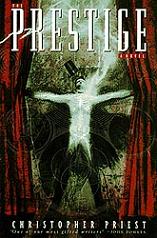
The Prestige
Christopher Priest
404 pages
published in 1995
I'll admit it: I only started reading The Prestige because I heard about the upcoming film. In my defence however, I had bought it years ago, in some charity shop in the UK somewhere. Beside which, I've been reading Christopher Priest's books for a long time now, off and on, the last one being The Separation. I've even met Christopher Priest at a couple of Dutch science fiction conventions and he's a rather charming guy. So while the movie may have given me the impetus to read this book now, I would've read it anyway. So there.
The Prestige is one of those books that can be as easily classified as science fiction, fantasy or magic realism. I've chosen to put it under fantasy because to me that seemed to fit the best. It seems to have made Priest's reputation as a literary writer, as opposed to a science fiction writer, or at least that's the impression I got reading around the internet about it. Certianly it's well suited to be a breakthrough book: well written, very readable, with a pinch of fantasy/science fiction but not too much.
As a writer, Priest has a reputation of playing narrative games with the reader, which is also the case here. He has the canny ability to tell a straight forward story which only with careful reading turns out to be entirely different from what you think it is. And he does it without letting his writing become unnecessarily dense or complicated.
The Prestige is the story of a feud between two stage magicians at the turn of the last century, Alfred Borden, weelwright turned stage magician and Rupert Angier, youngest disinherited son of the Earl of Colderdale, as it plays down through their families to the present day. The present day outcome of the feud is told through a framing story, which brings the two last remaining descendants of Borden and Angier, Andrew Westley and Kate Angier, together, when the latter lures the former to her country house in order to settle the feud. Andrew himself is ignorant of it all until Kate tells him about it and let's him read the diaries of his great-grandfather.
We then get to read Borden's diary and see the feud from his side. It turns out he started the feud when he was a young, self-righteous magician outraged at Rupert Angier using his magician talents to stage seances for recently bereaved people. He infiltrated one of Angier's seances and disrupted it, only realising afterwards what an arrogant fool he had been. He tries to apologise to Angier, but the latter will have none of it and the feud is on. In the beginning Borden tries to ignore Angier, but later he can't quite stop himself from attacking Angier's shows, though in his defense it seems every time he does stop, Angier renews the feud soon after.
It's only when Andrew and we get to read Rupert Angier's diaries we realise why Angier was so angry at Borden. His pregnant wife was at the seance and miscarried as a result of Borden's disruption. For a couple of years Angier attempts to systematically destroy Borden's career, only gradually coming to the conclusion the feud should stop before someone gets killed, but everytime he stops Borden starts the feud again. What makes it worse is Borden's new teleportation trick, which he just cannot figure out and which he obsessively tries to better, in which he succeeds, but at a cost...
In between the stories of the two antagonists we get the story of Kate Angier, who has a terrible secret of her own, which is also why she has lured Andrew to her house, to try and make amends. Her secret has to do with Andrew's sense of having a twin brother, even though all the official papers says he could not have been a twin. In the end, all the separate secrets and plotlines come together in a climax that makes everything clear.
The Prestige is a difficult book to review, because the story is so dependent on a gradual peeling away of layers of misdirection and secrets and even me telling you this makes you read the book differently than if you'd come to it fresh. However, even if this means you'll figure out the secrets earlier than Priest would've liked you to, this is still an enjoyable book, as there's as much pleasure in Priest's descriptions of late Victorian / Edwardian stage magic as there is in unravelling the story.
Read more about:
Christopher Priest,
The Prestige,
fantasy,
book review